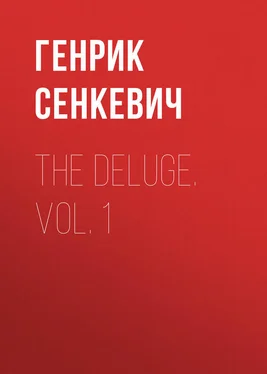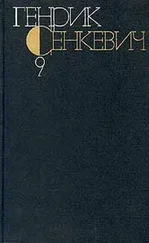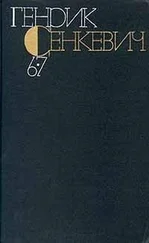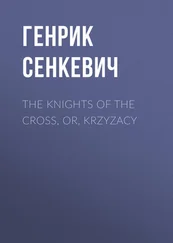Генрик Сенкевич - The Deluge. Vol. 1
Здесь есть возможность читать онлайн «Генрик Сенкевич - The Deluge. Vol. 1» — ознакомительный отрывок электронной книги совершенно бесплатно, а после прочтения отрывка купить полную версию. В некоторых случаях можно слушать аудио, скачать через торрент в формате fb2 и присутствует краткое содержание. Жанр: foreign_antique, foreign_prose, на английском языке. Описание произведения, (предисловие) а так же отзывы посетителей доступны на портале библиотеки ЛибКат.
- Название:The Deluge. Vol. 1
- Автор:
- Жанр:
- Год:неизвестен
- ISBN:нет данных
- Рейтинг книги:4 / 5. Голосов: 1
-
Избранное:Добавить в избранное
- Отзывы:
-
Ваша оценка:
- 80
- 1
- 2
- 3
- 4
- 5
The Deluge. Vol. 1: краткое содержание, описание и аннотация
Предлагаем к чтению аннотацию, описание, краткое содержание или предисловие (зависит от того, что написал сам автор книги «The Deluge. Vol. 1»). Если вы не нашли необходимую информацию о книге — напишите в комментариях, мы постараемся отыскать её.
The Deluge. Vol. 1 — читать онлайн ознакомительный отрывок
Ниже представлен текст книги, разбитый по страницам. Система сохранения места последней прочитанной страницы, позволяет с удобством читать онлайн бесплатно книгу «The Deluge. Vol. 1», без необходимости каждый раз заново искать на чём Вы остановились. Поставьте закладку, и сможете в любой момент перейти на страницу, на которой закончили чтение.
Интервал:
Закладка:
But at times he stopped his work. Evidently something was wrong with the mill, for at those times was heard his angry voice: "It's down!"
Panna Aleksandra raised her head, as if roused by the silence which followed the exclamations of the man; then the blaze lighted up her face and her serious blue eyes looking from beneath black brows. She was a comely lady, with flaxen hair, pale complexion, and delicate features. She had the beauty of a white flower. The mourning robes added to her dignity. Sitting before the chimney, she seemed buried in thought, as in a dream; doubtless she was meditating over her own lot, for her fates were in the balance. The will predestined her to be the wife of a man whom she had not seen for ten years; and as she was now almost twenty, there remained to her but unclear childhood reminiscences of a certain boisterous boy, who at the time when he with his father had come to Vodokty, was more occupied with racing through the swamps with a gun than in looking at her. "Where is he, and what manner of man is he now?" These were the questions which thrust themselves on the mind of the dignified lady. She knew him also, it is true, from the narratives of the late under-chamberlain, who four years before had undertaken the long journey to Orsha. According to those narratives, he was a cavalier "of great courage, though very quick-tempered." By the contract of marriage for their descendants concluded between old Billevich and Kmita the father, Kmita the son was to go at once to Vodokty and be accepted by the lady; but a great war broke out just then, and the cavalier, instead of going to the lady, went to the fields of Berestechko. Wounded at Berestechko, he recovered at home; then he nursed his sick father, who was near death; after that another war broke out, and thus four years passed. Since the death of the old colonel considerable time had elapsed, but no tidings of Kmita.
Panna Aleksandra therefore had something to meditate upon, and perhaps she was pining for the unknown. In her pure heart, especially because it knew not love as yet, she bore a great readiness for that feeling. A spark only was needed to kindle on that hearth a flame quiet but bright, and as steady as the undying sacred fire of Lithuania.
Disquiet then seized her, – at times pleasant, at times bitter; and her soul was ever putting questions to which there was no answer, or rather the answer must come from distant fields. The first question was whether he would marry her with good-will and respond with readiness to her readiness. In those days contracts by parents for the marriage of their children were usual; and if the parents died the children, held by the blessing, observed in most cases the contract. In the engagement itself the young lady saw nothing uncommon; but good pleasure does not always go hand in hand with duty; hence the anxiety that weighed down the blond head of the maiden. "Will he love me?" And then a flock of thoughts surrounded her, as a flock of birds surround a tree standing alone in spacious fields: "Who art thou? What manner of person? Art walking alive in the world, or perhaps thou hast fallen? Art thou distant or near?" The open heart of the lady, like a door open to a precious guest, called involuntarily to distant regions, to forests and snow-fields covered with night: "Come hither, young hero; for there is naught in the world more bitter than waiting."
That moment, as if in answer to the call, from outside, from those snowy distances covered with night, came the sound of a bell.
The lady trembled, but regaining her presence of mind, remembered that almost every evening some one came to Vodokty to get medicine for the young colonel.
Panna Kulvyets confirmed that idea by saying, "Some one from the Gashtovts for herbs."
The irregular sound of the bell shaken by the shaft rang more distinctly each moment; at last it stopped on a sudden. Evidently the sleigh had halted before the door.
"See who has come," said Panna Kulvyets to the man of Jmud who was turning the mill.
The man went out of the servants' hall, but soon returned, and taking again the handle of the mill, said phlegmatically, "Panas Kmitas." 7 7 Lithuanian forms, with nominative ending in s and as .
"The word is made flesh!" cried Panna Kulvyets.
The spinners sprang to their feet; the flax and the distaffs fell to the floor.
Panna Aleksandra rose also. Her heart beat like a hammer; a flush came forth on her face, and then pallor; but she turned from the chimney, lest her emotion might be seen.
Then in the door appeared a certain lofty figure in a fur mantle and fur-bound cap. A young man advanced to the middle of the room, and seeing that he was in the servants' hall, inquired in a resonant voice, without removing his cap, "Hei! but where is your mistress?"
"I am the mistress," said Panna Billevich, in tones sufficiently clear.
Hearing this, the newly arrived removed his cap, cast it on the floor, and inclining said, "I am Andrei Kmita."
The eyes of Panna Aleksandra rested with lightning-like swiftness on the face of Kmita, and then dropped again to the floor; still during that time the lady was able to see the tuft shaven high, yellow as wheat, an embrowned complexion, blue eyes, looking quickly to the front, dark mustache, a face youthful, eagle-like, but joyous and gallant.
He rested his left hand on his hip, raised his right to his mustache, and said: "I have not been in Lyubich yet, for I hastened here like a bird to bow down at the feet of the lady, the chief hunter's daughter. The wind-God grant it was a happy one! – brought me straight from the camp."
"Did you know of the death of my grandfather?" asked the lady.
"I did not; but I bewailed with hot tears my benefactor when I learned of his death from those rustics who came from this region to me. He was a sincere friend, almost a brother, of my late father. Of course it is well known to you that four years ago he came to us at Orsha. Then he promised me your ladyship, and showed a portrait about which I sighed in the night-time. I wished to come sooner, but war is not a mother: she makes matches for men with death only."
This bold speech confused the lady somewhat. Wishing to change the subject, she said, "Then you have not seen Lyubich yet?"
"There will be time for that. My first service is here; and here the dearest inheritance, which I wish to receive first. But you turned from the hearth, so that to this moment I have not been able to look you in the eye-that's the way! Turn, and I will stand next the hearth; that's the way!"
Thus speaking, the daring soldier seized by the hand Olenka, 8 8 The diminutive or more familiar form for Aleksandra. It is used frequently in this book.
who did not expect such an act, and brought her face toward the fire, turning her like a top. She was still more confused, and covering her eyes with her long lashes, stood abashed by the light and her own beauty. Kmita released her at last, and struck himself on the doublet.
"As God is dear to me, a beauty! I'll have a hundred Masses said for my benefactor because he left you to me. When the betrothal?"
"Not yet awhile; I am not yours yet," said Olenka.
"But you will be, even if I have to burn this house! As God lives, I thought the portrait flattered. I see that the painter aimed high, but missed. A thousand lashes to such an artist, and stoves to paint, not beauties, with which eyes are feasted! Oh, 'tis a delight to be the heir to such an inheritance, may the bullets strike me!"
"My late grandfather told me that you were very hot-headed."
"All are that way with us in Smolensk; not like your Jmud people. One, two! and it must be as we want; if not, then death."
Olenka laughed, and said with a voice now more confident, raising her eyes to the cavalier, "Then it must be that Tartars dwell among you?"
Читать дальшеИнтервал:
Закладка:
Похожие книги на «The Deluge. Vol. 1»
Представляем Вашему вниманию похожие книги на «The Deluge. Vol. 1» списком для выбора. Мы отобрали схожую по названию и смыслу литературу в надежде предоставить читателям больше вариантов отыскать новые, интересные, ещё непрочитанные произведения.
Обсуждение, отзывы о книге «The Deluge. Vol. 1» и просто собственные мнения читателей. Оставьте ваши комментарии, напишите, что Вы думаете о произведении, его смысле или главных героях. Укажите что конкретно понравилось, а что нет, и почему Вы так считаете.











